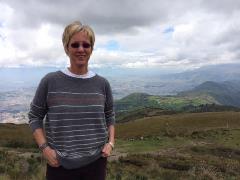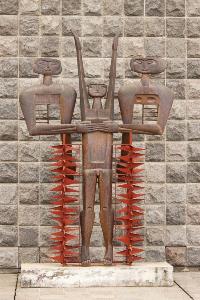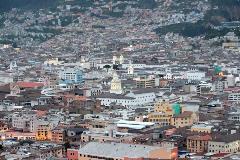Interview with Dr. Amy Lind
Conducted by Adrian Parr, Taft Faculty Chair & Center Director, Taft Research Center

Amy Lind is Mary Ellen Heintz Endowed Chair and Professor of Women’s, Gender, and Sexuality Studies, and affiliate faculty of Sociology, Romance Languages & Literatures, and the School of Planning. Her areas of scholarship and teaching include critical development studies, global political economy, postcolonial studies, queer theory, transnational feminisms, social movements, and studies of neoliberal governance. She is the author of Gendered Paradoxes: Women’s Movements, State Restructuring, and Global Development in Ecuador (Penn State University Press, 2005), and editor of four volumes, including Development, Sexual Rights and Global Governance (Routledge, 2010) and Feminist (Im)mobilities in Fortress(ing) North America: Rights, Citizenships and Identities in Transnational Perspective (Ashgate Publishing, 2013, co-edited with Anne Sisson Runyan, Patricia McDermott and Marianne Marchand). Currently she is working on two books: Decolonial Justice: Resignifying Nation, Economy and Family in Ecuador (with Christine Keating) and Gendering Global Political Economy (with Marianne Marchand and Rahel Kunz, Palgrave, forthcoming). She has held distinguished visiting professor positions in Ecuador, Bolivia and Switzerland and has delivered over fifty invited lectures at institutions around the world.
AP: Tell us a little about your research interests and how Ecuador became an area of focus.
 AL: I first became interested in Latin America when I was growing up in California. My cousin, Amy Conger, whom I am named after, was a professor in Santiago, Chile and was a political prisoner during the Pinochet dictatorship. I grew up watching her testify in front of US Congress and telling her story on national television. When I was an undergrad at UC Santa Cruz I studied abroad for a year in Lima, Peru. It was the height of Peru’s civil war: Maoist-based Shining Path had just reached Lima, there was a national curfew and a strong military presence, we lived through daily apagones(“brown-outs”) caused mostly by Shining Path bombing electric plants around the city, and life wasn’t easy for many Peruvians. There I worked with three feminist organizations and made friendships that I still have today. At UC Santa Cruz I studied with many great people who focused on postcolonial and development studies, critical theory, and/or Latin American politics: Arturo Escobar, Donna Haraway, Teresa de Lauretis, Sonia Alvarez, Lata Mani, bell hooks, Angela Davis, among others. Arturo Escobar’s research on development and the making of the “Third World,” a result of his own study with Michel Foucault, greatly influenced my own decision to pursue critical development studies at the graduate level (Arturo was an outside member on my doctoral committee). The unexpected consequence of Peru’s civil war was that I ended up conducting my doctoral research in Ecuador for two years, where I was a Fulbright and Inter-American Foundation fellow. It turned out to be an excellent place to study the politics of development, since at the time Ecuador was seen as a safe haven for international organizations, many of whom had their regional offices in Quito.
AL: I first became interested in Latin America when I was growing up in California. My cousin, Amy Conger, whom I am named after, was a professor in Santiago, Chile and was a political prisoner during the Pinochet dictatorship. I grew up watching her testify in front of US Congress and telling her story on national television. When I was an undergrad at UC Santa Cruz I studied abroad for a year in Lima, Peru. It was the height of Peru’s civil war: Maoist-based Shining Path had just reached Lima, there was a national curfew and a strong military presence, we lived through daily apagones(“brown-outs”) caused mostly by Shining Path bombing electric plants around the city, and life wasn’t easy for many Peruvians. There I worked with three feminist organizations and made friendships that I still have today. At UC Santa Cruz I studied with many great people who focused on postcolonial and development studies, critical theory, and/or Latin American politics: Arturo Escobar, Donna Haraway, Teresa de Lauretis, Sonia Alvarez, Lata Mani, bell hooks, Angela Davis, among others. Arturo Escobar’s research on development and the making of the “Third World,” a result of his own study with Michel Foucault, greatly influenced my own decision to pursue critical development studies at the graduate level (Arturo was an outside member on my doctoral committee). The unexpected consequence of Peru’s civil war was that I ended up conducting my doctoral research in Ecuador for two years, where I was a Fulbright and Inter-American Foundation fellow. It turned out to be an excellent place to study the politics of development, since at the time Ecuador was seen as a safe haven for international organizations, many of whom had their regional offices in Quito.
AP: What is the relationship between your research and critical development theory?
AL: Critical development theory is at the center of what I do. I was initially fascinated by how the idea of “development” came into being in the post World War II 1950s, as a way for Northern governments (especially the United States) and financiers to shift their attention away from reconstruction Europe, toward the global South. Petrodollars were abundant; and governments in Latin America, many of which were led by military authoritarian governments at the time, borrowed money with little concern for the long-term effects. As a region, Latin America has endured some of the highest inequality rates and harshest structural adjustment measures, yet it is also the first region to challenge the hegemonic global neoliberal order. Many people and social movements have participated in processes to redefine their nations, and they are these processes, which involve re-envisioning culture, politics and power in a postcolonial context, that most fascinate me.
 Understanding “development” also helps us understand how people think about their identities. People from poor backgrounds may want televisions yet they are also very aware of economic inequalities; inequalities that are a colonial legacy, and now a legacy of mainstream development policies such as those promoted by the World Bank and the International Monetary Fund. In my own research, I try to understand how people work in both hegemonic and marginalized spaces, in both the state and civil society, to create change in their communities and nations.
Understanding “development” also helps us understand how people think about their identities. People from poor backgrounds may want televisions yet they are also very aware of economic inequalities; inequalities that are a colonial legacy, and now a legacy of mainstream development policies such as those promoted by the World Bank and the International Monetary Fund. In my own research, I try to understand how people work in both hegemonic and marginalized spaces, in both the state and civil society, to create change in their communities and nations.
AP: The Human Rights 2013 Watch World Report denounced Ecuador's President Rafael Correa for undercutting the freedom of the press and compromising judicial independence in the country. I would be interested to hear your thoughts on freedom of expression in Ecuador and whether this figures in your own research.
AL: And these are just two of the controversial issues being discussed in Ecuador right now…
The interesting thing about the freedom of press issue is that President Correa offered asylum to Wikileaks founder Julian Assange, who is of course well known for defending freedom of speech and information sharing. Assange has been holed up in the Ecuadorian Embassy in London since June 2012. Yet within Ecuador, the Correa administration has created new laws that give the state more power in regulating the media. Some journalists have been fined for publishing “slanderous” material. Some are opting to publish on sensitive topics outside the country, for fear of persecution. Generally it contributes to a culture of fear, although I hesitate to say this because the situation is nothing like, for example, what is happening in Venezuela right now.
President Correa has also worked to centralize power in the judicial system, and he has suggested he might seek a constitutional amendment that would allow him to be re-elected for a third term. In March 2014 Ecuadorians voted in local elections and Correa’s political party, Alianza País (Country Alliance, or AP), lost in almost all districts. Candidates from Pachakutik, the indigenous party, won in two districts but the larger cities went to right-wing candidates. Nonetheless, Correa’s AP still holds majority seats in the National Assembly and according to polls he continues to have the highest popularity rating of all presidents in Latin America.
This might be in part due to the fact that Correa’s government passed one of the most progressive constitutions in the world in 2008 and his economic policies have reduced inequality rates and the total number of people living in poverty. His government is giving more than three times the amount of the last three governments combined to social spending, so at least at the economic level his government represents a sharp break from Ecuador’s neoliberal past.
AP: What role has Taft played in Ecuador research?
.tmb-medium.jpg?sfvrsn=bf990ecb_1) AL: In 2011-2012 I was fortunate enough to be a Taft Center Fellow, which allowed me to conduct archival research in Ecuador’s National Assembly Library and work on several journal articles and book chapters on sexual politics and Ecuador’s Citizen Revolution. And now, in Spring 2014, I am the recipient of a Taft Faculty Release Grant, which has allowed me to take a year-long sabbatical leave and complete my forthcoming book, Decolonial Justice: Resignifying Nation, Economy and Family in Ecuador, in addition to other projects I am working on in the area of sexuality and development. There is no doubt that the Taft Research Center is an invaluable resource for researchers and for UC’s intellectual community.
AL: In 2011-2012 I was fortunate enough to be a Taft Center Fellow, which allowed me to conduct archival research in Ecuador’s National Assembly Library and work on several journal articles and book chapters on sexual politics and Ecuador’s Citizen Revolution. And now, in Spring 2014, I am the recipient of a Taft Faculty Release Grant, which has allowed me to take a year-long sabbatical leave and complete my forthcoming book, Decolonial Justice: Resignifying Nation, Economy and Family in Ecuador, in addition to other projects I am working on in the area of sexuality and development. There is no doubt that the Taft Research Center is an invaluable resource for researchers and for UC’s intellectual community.
.tmb-medium.jpg?sfvrsn=4ed7ad1e_1)
Photo credits: Leticia Rojas, Michael Bosia, Lourdes Martínez-Echazábal, Larry La Fountain